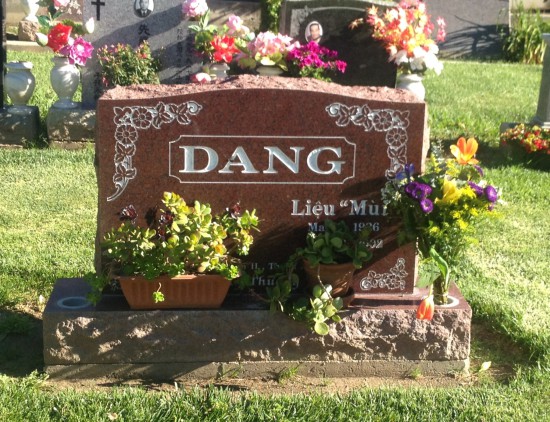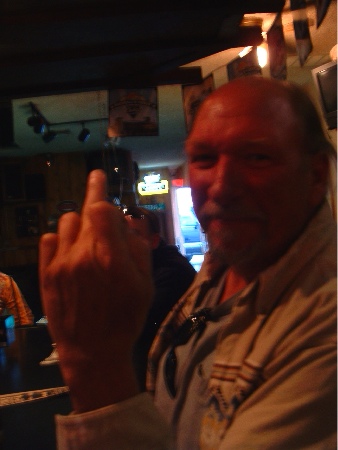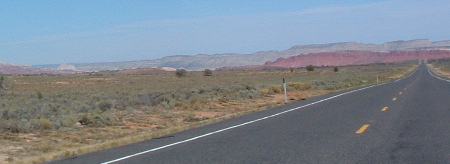Note: When you spend a long time driving, you have a lot of time to think of stuff. I pulled a few paragraphs out of this episode and put them in one of their own, but this is still one hell of a muddled ramble. Even without the Theology and sociology, we’ve got us some philosophy, a (somewhat disguised) treatise on storytelling, thoughts on agricultural practices, lovely, curvaceous roads, and lunch. Not in that order.
I slept rather late this morning, in a awkward position it would seem as my entire left arm was numb when I finally stirred. I lifted it and flexed it, enjoying the curious feeling while it lasted. How nice it is to be easily amused.
Awake, showered, ponytailed and behatted, coated liberally with PABA, I got the hell out of Dodge. One more life ambition checked off. I headed in the direction of Garden City. All around me food was being made. Big round fields of it stretched across the landscape, the radius of the circles defined by the length of the irrigation pipe. I heard the grumbling engines working to draw the water from the depths and pump it out to the thirsty plants. Sometimes I passed other factories dedicated to turning the vegetable food into meat food. The only exception to the single-minded devotion to food production was an occasional oil well. One way or another, it was all about energy.
I was well past Garden City when I started to wonder if that was the way I really should be going. Not so much, it turns out. At Lakin I made a course correction, crossing the Arkansas River and heading due south on Sunflower 25. The Arkansas was bone dry. As I went south the land became more sere, the spaces between the verdant circles greater and the uncultivated areas scrubbier. It occurred to me that, like the oil, the water would run out some day as well.
The highway was not crowded, and I was gradually catching up to an SUV. I thought I smelled burning rubber, and soon after a cloud of blue smoke came from the left side of the SUV. Only after a few more seconds did the driver hit his brakes and begin to move to the side of the road, the smoke getting thicker all the while. At first it was difficult to tell in the mirage of the hot pavement, but it seemed like something was separating from the truck. The something resolved itself into a tire, or at least the tread of a tire, a big rubber donut bounding across the road and into the ditch on the other side. The SUV pulled over, its naked, shiny chrome rim shooting sparks as it dragged across the pavement. The truck had super-low-profile tires on expensive wheels, and one of the tires had lost its sidewalls and gone off on its own. Important note to people who buy fancy tires like that: Check the pressure often. Those tiny sidewalls don’t give you any room for error.
Hugoton is an attractive little farm town, and I decided it would be a good place to break my fast. I stopped at Dominoes, which was doing a fair lunch business when I walked in. It may surprise you to learn that I was the only long-haired male in the place wearing a Hawaiian shirt and sandals. As any Czech will tell you, however, a friendly hello to the people in charge will almost always be returned in kind, and I found I had stumbled into a very friendly place. By Czech standards. The men in their blue jeans and shirts with snaps discussed offshore drilling and the price of oil (down nine cents), along with farm topics, and the waitress spent her time trying to drown me with iced tea. Ah, America! When I paid, she asked, “do you want some ice tea to go?”
I joined highway 56 in its dogged pursuit of WSW, across the Oklahoma panhandle. It’s the sort of road that people joke isn’t 100 miles but the same mile 100 times. One mile was different, however. At the side of the road was a cross, elaborately decorated. Someone had died there, presumably as the result of an automobile accident. I had to wonder, why there? Sometimes when you see a roadside memorial you can piece together what happened. A sudden curve or the end of a passing lane. You can see the threat the driver faced and understand it. Other times, like this time, there are no such clues, no such reason. It could have been any place along that road. But it happened there, at that mile, and that is where the story ends (or begins?), and that mile is forever changed.
I imagine there were people who asked, why him? after the accident. Perhaps there were clues, the driver’s own personal dangerous curves — drugs or alcohol or fatigue or cell phone. Perhaps not. Perhaps, just like that unlikely mile, there was nothing to mark that person for death. Someone else ran him off the road. He had a blowout. In that case, why him is just as meaningless as why there. There’s really now answer at all, no reason it might not be me next time.
Fuel in Clayton, and a decision to take the Cimarron-Taos scenic route. Not a difficult choice, really. I found myself on the sort of road small sports cars are made for, on the sort of day that convertibles are made for. (Note to drivers of big-ass pickup trucks creeping along at twenty miles per hour: If you see a bunch of cars behind you, just pull over for a moment. It’s obvious you’re not in a hurry anyway.)
How is it that Taos, NM, has near-perpetual traffic problems?
Now I am at the folk’s house, windows open, the temperature comfortably cool, thinking that I’ve spent way too much time blogging tonight (as I’m sure many of you will agree), especially since I have a story I thought up out there on the road that I want to start working on. That’s the thing about the road — you just can’t stop thinking of stuff.
Sharing improves humanity:



 It’s taken a few days for me to feel this. John Bevins was a friend of mine. I sat on the bar stool next to his, listening to his stories. I went to parties at his house, where he always put on a good spread. He was a nut, and occasionally a right bastard, but he was always a friend. He was the kind of man whose passing the world should mourn.
It’s taken a few days for me to feel this. John Bevins was a friend of mine. I sat on the bar stool next to his, listening to his stories. I went to parties at his house, where he always put on a good spread. He was a nut, and occasionally a right bastard, but he was always a friend. He was the kind of man whose passing the world should mourn. Somewhere between Hoover and Glen Canyon, on the stretch of road where I took this picture, it hit me. Not for the first time, not for the last. You know the feeling. You look at your lover/spouse/significant other over breakfast and the face you see just blows you away. “Wow!” you think to yourself. “I’m so damn in love!” It never gets old. Her face, his face, whoever’s face it is, strikes you as new and completely beautiful. It’s the first time you’ve ever really seen that face. There’s something about it that strikes your soul.
Somewhere between Hoover and Glen Canyon, on the stretch of road where I took this picture, it hit me. Not for the first time, not for the last. You know the feeling. You look at your lover/spouse/significant other over breakfast and the face you see just blows you away. “Wow!” you think to yourself. “I’m so damn in love!” It never gets old. Her face, his face, whoever’s face it is, strikes you as new and completely beautiful. It’s the first time you’ve ever really seen that face. There’s something about it that strikes your soul.